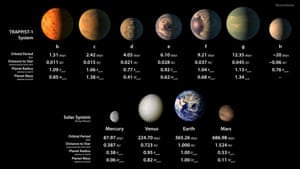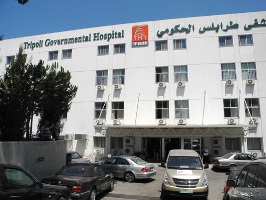
By Ian Sample – theguardian.com
A huddle of seven worlds, all close in size to Earth, and perhaps warm
enough for water and the life it can sustain, has been spotted around a
small, faint star in the constellation of Aquarius The discovery, which has thrilled astronomers, has raised hopes that
the hunt for alien life beyond the solar system could start much sooner
than previously thought, with the next generation of telescopes that are
due to switch on in the next decade.
It is the first time that so many Earth-sized planets have been found
in orbit around the same star, an unexpected haul that suggests the
Milky Way may be teeming with worlds that, in size and firmness
underfoot at least, resemble our own rocky home. The planets closely circle a dwarf star named Trappist-1,
which at 39 light years away makes the system a prime candidate to
search for signs of life. Only marginally larger than Jupiter, the star
shines with a feeble light about 2,000 times fainter than our sun.
“The star is so small and cold that the seven planets are temperate,
which means that they could have some liquid water and maybe life, by
extension, on the surface,” said Michaël Gillon, an astrophysicist at
the University of Liège in Belgium. Details of the work are reported in Nature. While the planets have Earth-like dimensions, their sizes ranging
from 25% smaller to 10% larger, they could not be more different in
other features. Most striking is how compact the planet’s orbits are.
Mercury, the innermost planet in the solar system, is six times farther
from the sun than the outermost seventh planet is from Trappist-1.








